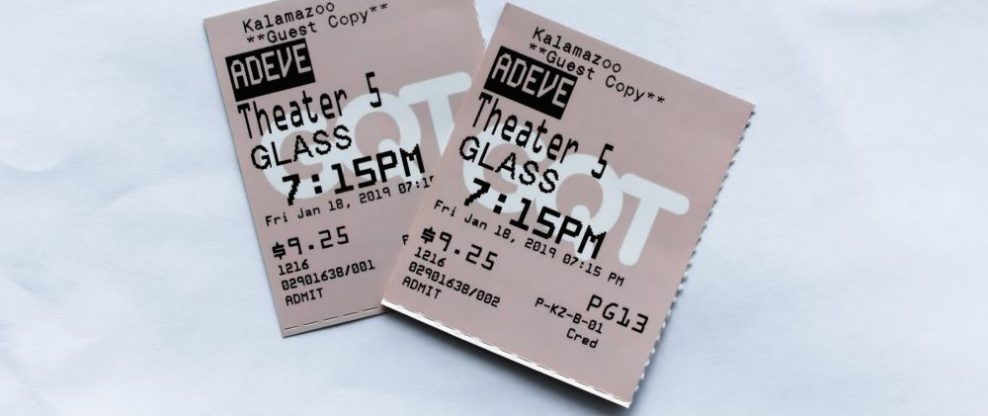By Casey Fraser
In November, the Department of Justice announced their intent to end or significantly alter the Paramount consent decrees, which stemmed from the pivotal U.S. v. Paramount Pictures case in 1948. The Department of Justice’s decision to pursue the removal of this statute has the potential to eliminate smaller theater chains. In an industry where competition is increasingly daunting, the reversal of the U.S. v. Paramount Pictures case does not serve those who require it the most. Rather than supporting independent distributors and exhibitors, the overturning of the Paramount consent decrees will further consolidate the entertainment industry and have a ripple effect on the industry’s economic landscape.

Photo Courtesy of Time Out
The Paramount consent decrees drastically changed the manner in which the entertainment industry functions. In the 1930s and 1940s, major film studios maintained a near-monopoly on the United States entertainment industry, according to A&E Television Networks History website. Film studios owned most theaters and were able to control their distribution and exhibition with minimal outside influence. The theaters that studios didn’t own were often subjected to “block booking,” a process in which studios require independent theater owners to show films as a unit, rather than booking individual films. For example, if Metro-Goldwyn-Mayer wanted to show their low-budget film at a theater in the 1930s, they could sell it as a package with the 1939 blockbuster Gone With the Wind. This flawed system allowed major studios to coordinate with one another and squash innovation in the industry.
The 1948 case was preceded by a lawsuit in 1928 filed by the Federal Trade Commission against ten major film studios for similar antitrust violations. The court ruled that the ten studios were guilty of antitrust violations in 1930 according to the Hollywood Renegades Archive. Despite this ruling, the studios were allowed to resume normal business operations due to extenuating circumstances that stemmed from the Great Depression and subsequent National Industry Recovery Act according to A&E Television Networks History website.
Eight years later, the issue of studio monopolies became a topic of discussion once again. In 1938, the government filed an antitrust lawsuit against Paramount Pictures, Inc., Universal Corporation, Loew’s Incorporated (later renamed Metro-Goldwyn-Mayer), Twentieth Century-Fox Corporation, Warner Brothers Pictures, Columbia Pictures Corporation, United Artists, and Radio-Keith-Orpheum Pictures (which was dissolved in 1959), according to the United States Department of Justice website. The government accused the plaintiffs of controlling all movie distribution and exhibition, a direct violation of the Sherman Antitrust Act. In their initial filing, the government called for studios to sell their direct distribution channels (mainly theaters) and stop block booking all together.
The case was quickly dismissed in favor of an out-of-courtroom settlement. Frustrated with the results of the settlement (which allowed studios to maintain their theater ownership and better regulate block booking), the newly formed Society of Independent Motion Picture Producers lobbied for further restrictions on the studio system according to A&E Television Networks History website. Their efforts pushed the matter back into court and this time, the studios were not so lucky. The New York District Court ruled against the studios in 1946. Both sides were unhappy with the ruling and appealed. The U.S. Supreme Court issued a decision in 1948, once again ruling against the studios according to the National Constitution Center.

Photo Courtesy of Unsplash
As a result of the U.S. v. Paramount Pictures case, the plaintiffs agreed to a settlement termed the Paramount consent decrees. Studios were required to sell their theaters, separating film distribution and film exhibition. The studios were also prohibited from block bidding and other monopolistic practices such as circuit dealing, resale price maintenance, and granting overboard clearances, according to the United States Department of Justice website. Lastly, studios were banned from owning theaters without first receiving court approval.
The implementation of the Paramount consent decrees split up the major studios and reshaped the way that entertainment businesses operate. Studios took a “theater-by theater, picture-by-picture” mindset according to Deadline. No longer able to use their blockbuster films to leverage the sale of their smaller productions, studios began to rely on more nuanced marketing and sales techniques. This policy is still used today by major studios. The dissolvement of vertical integration in entertainment also allowed newer studios such as Disney to succeed in the marketplace.
Last month, Assistant Attorney General Makan Delrahim addressed the Department of Justice’s decision to pursue eliminating the Paramount consent decrees during his address at the American Bar Association’s Antitrust Fall Forum. In his speech, Delrahim pronounced the decrees outdated and overly restrictive. “We [the Department of Justice] have determined that the decrees, as they are, no longer serve the public interest, because the horizontal conspiracy – the original violation animating the decrees – has been stopped,” said Delrahim. “Changes over the course of more than half a century also have made it unlikely that the remaining defendants can reinstate their cartel.”
The Department of Justice is correct to assume that sections of the Paramount consent decrees are dated. In contemporary times, the entertainment industry looks vastly different than when the decrees were first decided upon. In the 1930s and 1940s, urban areas traditionally had one movie theater with “one screen that showed a single movie at a time,” according to Delrahim. Today, theaters are more numerous with more screens in each establishment. This allows theaters to play multiple movies from different distributors at the same time. In the city of Los Angeles, there are currently 62 open movie theaters according to Cinema Treasures. The largest of these theaters, Cinemark 18 and XD Los Angeles, has a total of 18 screens.

Photo Courtesy of Cinema Treasures
The idea of studios controlling the marketplace through theater ownership is also a concern of the past. The streaming industry has revolutionized film distribution and exhibition. Rather than watching movies in theaters, consumers have a multitude of options for in-home entertainment. Netflix, Hulu, Amazon Prime, and Apple TV+ are amongst the well-known brands that offer subscription video on demand services. Unlike the major studios, these streaming companies are not bound by stringent distribution and exhibition regulations. Eliminating the Paramount consent decrees could help studios remain competitive with streaming companies by removing regulations that limit a studio’s scope.
The unintended consequence of the Department of Justice’s announcement is the potential impact on smaller, independent theater chains. Without the Paramount consent decrees, small theater chains will likely have to compete with studio-owned theaters. The department’s decision also reopens the door to block booking practices. Theoretically, if a company like Disney wanted to attach a niche Fox Searchlight film to their upcoming live-action remake of The Little Mermaid, they be able to do so with no negative consequences. Larger multiplexes and theater chains such as AMC, Regal, and Cinemark have the scale to withstand this change but independent theater chains will suffer the financial consequences.
For theaters that can only house two to six movies at a time, the return of block booking poses a serious dilemma. Independent theaters are already struggling to keep up with increasing demand for a luxury theatrical experience. If small theaters are required to house a slate of studio films in order to obtain in-demand blockbuster movies, they will no longer be able to curate their programming to maximize profits. Adding undue stress to an already frail ecosystem could have potentially disastrous consequences. Amongst other small theater chains, Box Tie Cinemas voiced their distress regarding the impending changes. During the sixty-day public comment period about the decrees, a representative from the theater chain spoke out in opposition to the proposed change. “Chains of Bow Tie’s size (and smaller) would be disproportionately affected by the removal of block booking prohibitions, as we do not have as many screens to potentially spread out the major studio films we would be required to book in order to have access to the films our customers desire,” the representative said, according to Indie Wire. “The prohibition on block booking is necessary…to prevent theater chains such as Bow Tie from becoming de facto exclusive exhibitors of a particular studio’s content.” The National Association of Theatre Owners echoed these concerns to the Department of Justice. “If distributors are permitted to block book, they could demand exhibitors book an entire slate on multiple screens, leaving little room for the independent and smaller distributors to finance and distribute films that consumers demand,” the association commented according to Deadline.
The National Association of Theatre Owners also expressed concern that removing the Paramount consent decrees will halt conversations about modernization in the theater industry according to Deadline. One innovation currently being discussed in the industry is dynamic pricing, a model that prices films based on their desirability rather than setting a standard price for all movies. AMC has recently been experimenting with this model and plans to roll it out in four major cities. The purpose of dynamic pricing is to revitalize the theatrical experience and draw more audiences to theaters. Advancements such as this could be discontinued if studios take control of exhibition channels such as theaters.

Photo Courtesy of Celebrity Access
Overturning the U.S. v. Paramount Pictures case has the capacity to cause a ripple effect throughout the entertainment industry. If studios control theatrical releases, there is limited room for independent movies to succeed. As the barrier to entry increases for filmmakers and financiers, the number of jobs in film will decrease. In this environment of limited competition, it is the consumer who pays the ultimate price. Ironically, stifling innovation is exactly what the Department of Justice aims to avoid by overturning the Paramount consent decrees.
Some entertainment experts believe that eliminating the Paramount consent decrees will not significantly alter the industry. Established entertainment companies are stretched thin due to recent acquisitions and expansions. For example, Disney acquired Twenty-First Century Fox in March and launched their new streaming service Disney+ in November. If torn between investing their remaining capital in theater acquisitions or streaming content, it is practical to assume that companies will choose the latter. This hypothesis may hold true in the short-term but as time passes, studios will likely take advantage of the decrees reversal. Entertainment companies are always looking for ways to expand their businesses and please investors. Owning theaters gives the studios an opportunity to further promote their content and control pricing, in addition to providing an additional revenue stream. Even with the Paramount consent decrees in place, several studios skirted the rules and branched into owning theaters. For example, Disney currently owns the El Capitan theater in Los Angeles. The larger issue stems from the potential for block bidding, which costs studios no additional capital and could cause significant damage to the revenue of smaller theaters.
In anticipation of the challenges associated with repealing the Paramount consent decrees, Delrahim noted the Department of Justice intends to implement a two-year “sunset period” to give studios and theaters time to adjust to the removal of the consent decrees. During this time period, the entertainment business will be able to examine “any licensing proposals that seek to change the theater-by-theater and film-by-film licensing structure currently mandated by the decrees,” according to Delrahim’s speech. Delrahim also noted that the elimination of the Paramount consent decrees does not mean that studios are exempt from government regulation. “Terminating the Paramount decrees does not mean that the practices addressed in them are now considered per se lawful under the antitrust laws,” Delrahim said. “Consistent with modern antitrust law…if credible evidence shows a practice harms consumer welfare, antitrust enforcers remain ready to act.”
By eliminating the Paramount consent decrees, the Department of Justice aspires to “clear the way for consumer-friendly innovation,” according to Delrahim’s speech. Unfortunately, creating a landscape conducive to innovation is not as simple as repealing old legislation. The Department of Justice’s comments show that they do not fully understand the entertainment landscape and the potential consequences of repealing the Paramount consent decrees. By disregarding the findings of the U.S. v. Paramount Pictures case, the Department of Justice is further encouraging a monopolistic economy. Instead of studios being the sole contributor to this noncompetitive environment, both streaming services and studios are at fault. The potential overturning of the Paramount consent decrees illustrates a wide-reaching conundrum currently facing the entertainment industry. As established entertainment companies continue to merge, expand, and acquire, there is limited room for smaller companies in the marketplace. In this era of fast-paced consolidation, the industry must figure out how to regulate itself and avoid the type of problems that sparked the Paramount consent decrees over 70 years ago.
Sources: